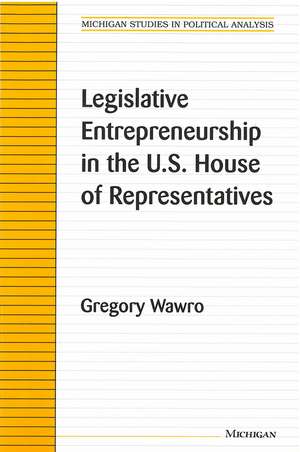Legislative Entrepreneurship in the U.S. House of Representatives: Michigan Studies In Political Analysis
Autor Gregory Wawroen Limba Engleză Paperback – 30 iul 2001
When members are elected to the House of Representatives they have a certain freedom to decide how they will act as members and how they will build their reputations. Just as in the market place entrepreneurs build businesses, so in the House of Representatives members have the freedom to choose to build legislative programs that will enhance their reputations in the institution. And yet entrepreneurship is also costly to members. Gregory Wawro explains why members of the House engage in legislative entrepreneurship by examining what motivates them to acquire policy knowledge, draft legislation, build coalitions, and push their legislation in the House. He considers what incentives members have to perform what many have perceived to be the difficult and unrewarding tasks of legislating.
This book shows how becoming a legislative entrepreneur relates to members' goals of reelection, enacting good public policy, and obtaining influence in the House. The analysis differs from previous studies of this behavior, which for the most part have employed case study methods and have relied on anecdotal evidence to support their arguments. Wawro analyzes legislative entrepreneurship in a general and systematic fashion, developing hypotheses from rational-choice-based theories and testing these hypotheses using quantitative methods.
Wawro argues that members engage in legislative entrepreneurship in order to get ahead within the House. He finds that the more legislative entrepreneurship that members engage in, the more likely it is that they will advance to prestigious positions.
This book is of interest to students of Congress, legislative behavior and institutions, elections, and campaign finance.
Gregory Wawro is Assistant Professor of Political Science, Columbia University.
This book shows how becoming a legislative entrepreneur relates to members' goals of reelection, enacting good public policy, and obtaining influence in the House. The analysis differs from previous studies of this behavior, which for the most part have employed case study methods and have relied on anecdotal evidence to support their arguments. Wawro analyzes legislative entrepreneurship in a general and systematic fashion, developing hypotheses from rational-choice-based theories and testing these hypotheses using quantitative methods.
Wawro argues that members engage in legislative entrepreneurship in order to get ahead within the House. He finds that the more legislative entrepreneurship that members engage in, the more likely it is that they will advance to prestigious positions.
This book is of interest to students of Congress, legislative behavior and institutions, elections, and campaign finance.
Gregory Wawro is Assistant Professor of Political Science, Columbia University.
Preț: 179.35 lei
Nou
Puncte Express: 269
Preț estimativ în valută:
34.33€ • 36.07$ • 28.85£
34.33€ • 36.07$ • 28.85£
Carte indisponibilă temporar
Doresc să fiu notificat când acest titlu va fi disponibil:
Se trimite...
Preluare comenzi: 021 569.72.76
Specificații
ISBN-13: 9780472088140
ISBN-10: 0472088149
Pagini: 208
Ilustrații: 10 drawings, 33 tables
Dimensiuni: 152 x 229 x 18 mm
Greutate: 0.34 kg
Ediția:Revised
Editura: UNIVERSITY OF MICHIGAN PRESS
Colecția University of Michigan Press
Seria Michigan Studies In Political Analysis
ISBN-10: 0472088149
Pagini: 208
Ilustrații: 10 drawings, 33 tables
Dimensiuni: 152 x 229 x 18 mm
Greutate: 0.34 kg
Ediția:Revised
Editura: UNIVERSITY OF MICHIGAN PRESS
Colecția University of Michigan Press
Seria Michigan Studies In Political Analysis
Notă biografică
Gregory Wawro is Assistant Professor of Political Science, Columbia University.
Recenzii
"Focusing on the opportunity-rich environment of the House for each member of the 94th through the 103rd Congresses, Wawro employs a broad rigorous empirical approach derived from rational choice theories to study the ambitions behind members who behave extraordinarily and the consequences of their behavior. . . . Legislative Entrepreneurship in the U.S. House of Representatives extends our understanding of members [sic] ambitions, incentives, and behavior within the House and returns our attention to the critical actors who behave extraordinarily to make the House of Representatives run."
—Craig Williams, APSA Legislative Studies Section Newsletter, January 2001
—Craig Williams, APSA Legislative Studies Section Newsletter, January 2001
". . . offers a refreshing look at how members of Congress operate and puts some well-reasoned arguments behind the idea that representatives really do want to make a difference."
—Nationaljournal.com, May 30, 2002
—Nationaljournal.com, May 30, 2002
"An inventive study, using a variety of data sources to great advantage. . . . Methodologically sophisticated and innovative. . . . This is an important study that will be of great interest to students of legislative politics on both sides of the Atlantic."
—Eric M. Uslaner, The Journal of Legislative Studies, Winter 2000
—Eric M. Uslaner, The Journal of Legislative Studies, Winter 2000
Descriere
Why do some members of the U.S. House of Representatives become legislative entrepreneurs?




